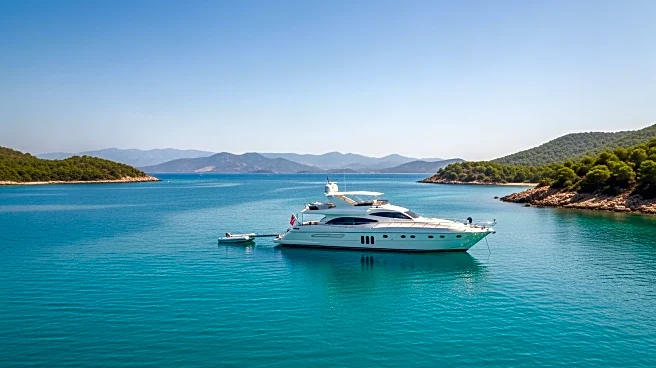What's Happening?
Red Sea Global is set to open AMAALA Triple Bay, a new coastal development on Saudi Arabia's north-western coast, featuring six resorts, a yacht club, and various wellness and marine facilities. The project
is part of Saudi Arabia's Vision 2030, aiming to create 50,000 jobs and contribute SAR 11 billion to the country's GDP. The first phase includes nine resorts with over 1,600 keys, powered entirely by renewable energy, and aims for a 30% net conservation benefit by 2040. Access is facilitated through Red Sea International Airport, with direct flights from major cities.
Why It's Important?
The AMAALA development is a significant step in Saudi Arabia's Vision 2030, which seeks to diversify the economy and reduce dependence on oil revenues. By investing in tourism and hospitality, the project aims to attract international visitors, boost local employment, and contribute to economic growth. The focus on renewable energy and conservation aligns with global sustainability trends, potentially positioning Saudi Arabia as a leader in eco-friendly tourism. The development could also enhance regional connectivity and international relations through improved infrastructure and travel routes.
What's Next?
The AMAALA project is expected to accommodate up to 500,000 visitors annually, with further expansions and enhancements planned. The reopening of AlWajh Airport in 2026 will improve connectivity, and additional European flight routes are anticipated. The focus on regenerative tourism and conservation efforts will continue to evolve, potentially influencing future developments in the region. Stakeholders, including government entities and international investors, will likely monitor the project's impact on the economy and environment closely.
Beyond the Headlines
The AMAALA project reflects broader cultural and economic shifts in Saudi Arabia, as the nation seeks to modernize and open up to global influences. The emphasis on wellness and luxury tourism may attract a diverse range of visitors, fostering cultural exchange and international partnerships. The project's success could inspire similar initiatives in other regions, promoting sustainable tourism and economic diversification.










